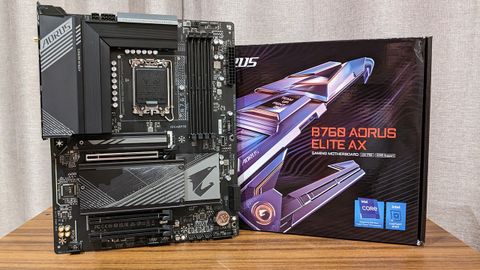Our Verdict
The B760 Aorus Elite AX is a good value for money offering, but at this price its missing a few features I feel should be included. If you're looking for a no frills motherboard to run with low or high end parts, it will still do the job.
For
- Quality VRM and heatsinks
- 3x M.2 PCIe 4.0 slots
- Available in DDR4 and mATX versions
Against
- No USB 3.2 Gen 2x2
- No PCIe 5.0 x16 slot
- Bland design
PC Gamer's got your back
A lot has been said about the ever-increasing expense of PC gaming hardware, Whether the reasons given are mining, covid lockdowns, inflation, logistics, or the passage of Mercury across the face of the Sun, it's true: stuff costs too much. But Intel's B760 motherboards are at least generally at the lower bounds of crazy pricing.
Do you have one GPU? An SSD or two? A good B760 board will have you covered.
Many B760 boards offer good value for money and some have just about every key feature and characteristic a 2023 gamer reasonably requires. Do you have one GPU? An SSD or two? Need some fast USB ports for your gadgets and gizmos? A good B760 board will have you covered and should not be overlooked.
Up for review today I have the Gigabyte B760 Aorus Elite AX. It sits at the upper end of Gigabyte's B760 range. Only the B760 Aorus Master is above it. It's priced at $189, though it is sometimes below this with a promo discount. That's not bad for what you get.
In the UK its relatively more expensive at around £239 while in Australia it's AU$409, though AU availability appears to be limited. The Elite AX also comes in a DDR4 flavor, and there are Micro-ATX versions too, so it's understandable that not all SKUs will be available in all markets.
The B760 Aorus Elite is an ATX board, and that means it doesn’t have the space constraints of some of the other boards I've reviewed including the MSI MAG B760M Mortar Max WiFi and ASRock B760M PG Sonic WiFI.
Notably, the Aorus comes with three M.2 drive slots and three PCIe x16 slots, though the bottom two run at PCIe 3.0 x1 electrically. It's also worth noting that the primary slot doesn't support PCIe 5.0. That means nothing right now, but it may do in the years to come.
Gigabyte B760 Aorus Elite AX overview and specs
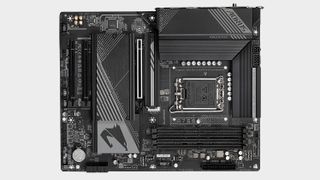
Socket: Intel LGA 1700
CPU compatibility: Intel 12th & 13th Gen desktop processors
Form factor: ATX
Memory support: DDR5-7600 (OC), Up to 192GB
Storage: 3x M.2, 4x SATA
USB: Up to 3x USB 3.2 Gen 2, 6x USB 3.1 Gen 1, 8x USB 2.0
Display: 1x HDMI 2.0, 1x DP 1.2
Networking: Realtek 2.5G LAN, Intel Wi-Fi 6E
Audio: Realtek ALC897
Price: $189 | £239 | AU$409
Looks are always in the eye of the beholder. Within reason, looks don't really matter but I have to confess to not being a big fan of the design. There are a few too many random lines running all over the place and it seems a bit bland. Unless it was orange or was purple with graffiti on it (oh, wait a sec) it wouldn’t stop me from buying the board if the rest of the thing measured up.
There's a clear trend emerging with motherboards moving away from excessive RGB and in many cases, such as with the Aorus Elite AX, omitting it altogether. It's always good to retain the option, though, and to that end there are four RGB headers, two of which are addressable. Other notable headers include support for six fan/pumps, a USB 3.2 Gen 2 Type-C case connector, a Gen 1 connector and a reset button, but no on/off button.
Does anyone remember B460 and older boards? You're not alone if you don't. They were stuck with DDR4-2666 memory or DDR4-2933 with a high-end chip. Yuck. Perhaps B-series boards still haven’t recovered from their 'cheap' and thankfully obsolete reputation. Forget that though. The B760 Aorus Elite supports up to DDR5-7600 and the F2 and later BIOS options support 24GB and 48GB memory modules, allowing support for a total of 192GB of memory. That's way more than enough for any gaming system.
I noted above that the board includes three M.2 slots. They all support PCIe 4.0 x4 drives. The topmost slot features a chunky heatsink with a well designed retention mechanism. The other two are cooled by a single heatsink with a large area. Still, I'd prefer to see at least one of these slots positioned where the CMOS battery sits, as placing M.2 heatsinks underneath a hot running graphics card can lead them to absorb heat rather than dissipate it. It shouldn't matter for a general storage drive... hopefully! There are four SATA ports too.






As the B760 Aorus Elite AX is a premium B760 board, it's got to have a VRM that can run up to an Intel Core i9 13900K without any issue. It comes with a 12+1+1 phase VRM with 60A stages, and is powered by 8-pin and 4-pin power connectors. It's not the most powerful VRM you'll ever come across, but it happily ran my i9 13900K without any problem and, as you can't overclock outside of power limit tweaks, that's all it has to do.
The heatsinks are on the larger side, it's good to see more affordable boards with heatsinks that wouldn't have been out of place on good Z series boards from a few years back. During a 10-minute Cinebench loop, the maximum temperature I saw was 56°C. That's a bit higher than the MSI Z790 Mortar Max WiFi I recently reviewed, but it's still a good result.
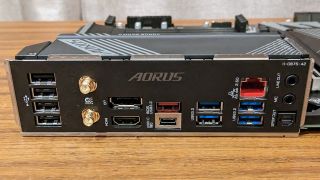
Moving onto the rear I/O, it's great to see a very good set of connectors. About the only thing missing is USB 3.2 Gen2x2 (20Gbps) support. Four USB 2.0 ports are joined by a pair of 10Gbps ports (one of which is Type-C) and four 5Gbps ports.
Realtek 2.5G LAN and Intel AX211 WiFi 6E controllers take care of networking duties while a Realtek ALC897 codec with line in, line out and S/PDIF provides audio support. ALC897 is nothing special but it will do a job provided you're not hoping for the ultimate symphony orchestra experience.
Finally, you get DP 1.2 and HDMI 2.0 ports. These can still drive a 4K monitor at 60Hz and, though you're unlikely to game with integrated graphics, it seems odd that Gigabyte didn’t include HDMI 2.1 and DP 1.4 as many other B760 boards do.
Gigabyte B760 Aorus Elite AX performance
System Performance






Gaming Performance





Gigabyte B760 Aorus Elite AX analysis
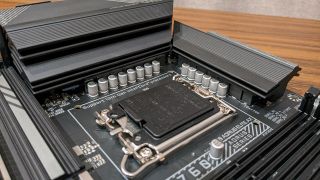
CPU: Intel Core i9 13900K
Graphics: Nvidia GeForce RTX 4090 Founders Edition
RAM: 2x 16GB G.Skill Trident Z5 DDR5-6000 C30
Storage: 2TB Seagate FireCuda 530
Cooling: Cooler Master PL360 Flux 360mm AIO
PSU: Corsair AX1000
When it comes to performance, the B760 Aorus Elite AX performed as expected. I always set my i9 13900K to Intel's default power limits in order to prevent the board from applying unreasonable 'overclocked' power levels. Despite this, the Gigabyte still scored over 37,000 in Cinebench, easily ahead of the other boards, even though the other heavily threaded tests were as expected. Still, it's better to be pleasantly surprised instead of negatively.
The gaming results showed the Aorus performing as expected, with margin of error differences separating the four tested boards.
I noted the B760 Aorus Elite supports up to DDR5-7600. I was pleased to see it happily run my G.Skill Trident Z5 DDR5-7200 without an issue. Honestly, not many users will pair ultra high end memory with a B760 board, but it's great to see Intel B-series boards running high end memory without any fuss.
I do like Gigabyte's Easy Mode BIOS page. It has a simple layout with your basic boot sequence selection, XMP setting, and monitoring info. It's a good design for users who hardly ever visit the BIOS.
Gigabyte B760 Aorus Elite AX verdict
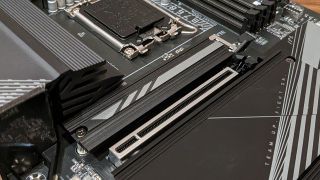
At $189 / £239 / AU$409 the Aorus Elite AX offers good value for money, and although the competition in this range is tough, most of it comes from DDR4 and mATX boards. It's a good option if you're the kind of user looking for a set and forget kind of system. Chuck in a GPU, any 12th or 13th gen CPU of your choosing plus an SSD or two or three and you're good to go.
The Aorus is also worth a look if you have two PCIe x1 expansion cards, as many B760 boards are lacking in expansion potential, particularly the space restricted mATX offerings. I really would like to see a 20Gbps USB port and PCIe 5.0 GPU support and I think the positioning of the secondary M.2 slots isn't ideal, but these aren't deal breakers at this price.
The Aorus Elite AX offers good value for money, and although the competition in this range is tough, most of that comes from DDR4 and mATX boards.
In the end, while the B760 Aorus Elite AX is a solid option offering good value with lots of USB connectivity and networking, it doesn't do enough to truly stand out in a market crowded with similar options. But that can be said of just about any mid-tier B760 board. If you're a fan of the Aorus brand and you're the sort of user that prefers to focus on your gaming and not on the system that runs it, the Gigabyte is a good option. It's the kind of value-oriented board that will happily run a high-end CPU and GPU.
Compared to a more expensive Z790 board, The B760 Aorus Elite AX is affordable enough to allow you to divert a few hundred towards a better CPU or GPU or a bigger SSD. These are the really important things that add performance to your system.
The B760 Aorus Elite AX is a good value for money offering, but at this price its missing a few features I feel should be included. If you're looking for a no frills motherboard to run with low or high end parts, it will still do the job.

Chris' gaming experiences go back to the mid-nineties when he conned his parents into buying an 'educational PC' that was conveniently overpowered to play Doom and Tie Fighter. He developed a love of extreme overclocking that destroyed his savings despite the cheaper hardware on offer via his job at a PC store. To afford more LN2 he began moonlighting as a reviewer for VR-Zone before jumping the fence to work for MSI Australia. Since then, he's gone back to journalism, enthusiastically reviewing the latest and greatest components for PC & Tech Authority, PC Powerplay and currently Australian Personal Computer magazine and PC Gamer. Chris still puts far too many hours into Borderlands 3, always striving to become a more efficient killer.

Genshin Impact's missing English voice acting returns in its latest trailer, but players aren't sure if they should celebrate yet

Palworld developer reports Nintendo's suing over 3 Pokémon patents for only $66,000 in damages, but a videogame IP lawyer says fighting the lawsuit could mean 'burning millions of dollars'

The best Black Ops 6 map for XP grinding finally got a 24/7 playlist, so you know what to do
